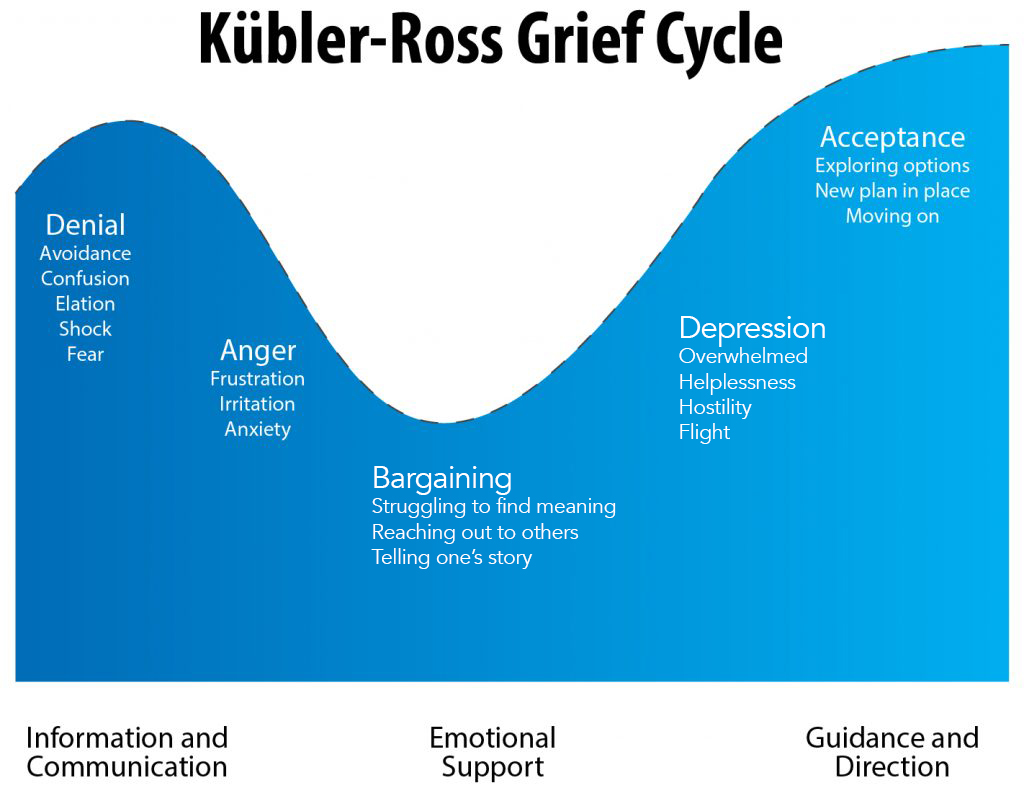It is often a very difficult process for a family or individual to grieve over the loss of a pet. Whether the pet was very sick and died rather unexpectedly, or when the pet was 17 years old and simply died of “old age”. Most of us consider out pets as a true family member and close companion, and it hurts when they leave us.
It is okay to grieve this loss. You will most likely process through this loss in phases known as the five stages of grief, much like you would with any close friend or family member. It also behooves us to realize that grief is not a linear process. You may even go back and forth between the stages before finally coming to the end of the process. Elizabeth Kubler Ross (1969) is credited with first publishing this concept of the 5 stages, also called DABDA. The graph below helps depict these stages in a non-linear fashion.

DENIAL
Shock is very common when a pet is either first diagnosed with a terminal illness and/or has just died. You may be confused by such a diagnosis and want to deny the reality. There may also be fear of the process of how your pet will eventually pass. Information is often one of the best ways to combat these initial reactions. Communicate with your veterinarian to learn more about the diagnosis and any treatments, possibly for prolonging life or for relief of pain. Discuss what might be best for your pet and for you and your family. Talking with your family and giving them the news of the illness or death can be difficult for a parent. Nobody wants to announce such terrible news. And while dealing with your own grief, you are also helping your children process the inevitable. Researching together about the illness and/or how others have been able to better get through such a difficult time will be helpful, prompting some discussion between family members.
We have had several dogs die over the years in our family. Two that were rather sudden were Oscar, our little red dachshund whom we witnessed get struck by a speeding truck in front of our house, and our little black and brown dachshund, Sadie, who died about three weeks after giving birth to four puppies. When Sadie died, I was all by myself at home. My husband was away in another state, teaching, I had a daughter away at college, and my youngest was visiting friends. I had been keeping a close eye on her because she seemed to be struggling. Then at one point, I was walking down the stairs and could see the large steel crate that housed her and her puppies in the family room. While the puppies were moving around and whining, Sadie was very still. I thought…”oh, no, it can’t be…” But it was, she had passed away. I actually felt guilt that I wasn’t by her side or holding her to comfort her. She was a special little gal to all of us. I was shocked and confused. What was I going to do with her and how was I going to keep those puppies alive? I texted my husband to tell him I needed to talk with him ASAP. He called me shortly after. I burst into tears. It was so gut-wrenching to have to pull her out of that crate, her little lifeless form in my hands. Honestly, as I’m thinking of it, my eyes are moist. It truly was a difficult moment. We had decided to bury her at the edge of the woods behind our house, as we were bordered on two sides by several acres of wooded land. But I had to do this all on my own. I bawled as I dug the hole and then placed her wrapped body into it and covered it. I then placed a concrete squirrel statue on her grave, in remembrance of her love of chasing squirrels.
ANGER
The next stage involves often a lot of frustration and anxiety about why this loss has happened and that life just isn’t fair. We can be angry that we lost such a loving pet. If the pet suffered through a terminal illness, this can make it even more difficult for this stage. Just remember that it is normal to question and to be angry for your loss and the way in which it happened. It might be that you even blame someone else for the death. In the case of Oscar, we of course blamed our neighbor because of his excessive speed and careless driving. We actually experienced the denial and anger all at the same time those first hours and days. I recall my husband angrily telling the neighbor (who didn’t stop, by the way) about his careless and thoughtless actions. Once again, this feeling is natural. Don’t be ashamed to let it happen. Go ahead and truly feel it and talk about it. It may help you feel more real and help bridge that gap between the feeling of being lost and disconnected to that feeling of certainty, of being alive.
Bargaining
Often, you find yourself negotiating with yourself, and maybe even others, about how things could change to be able to go back to that time before the grief. Some people find themselves grasping onto a false hope in this way. You may also find guilt in this stage, such as we talked about in the Denial stage. You may feel guilty that you didn’t take your pet into the vet when you first thought there might be something wrong…or guilty that you didn’t see the signs at all. You might try to negotiate your way through this thinking. This is okay. Go ahead and process these thoughts. It is normal. Find someone to talk about this guilt and negotiation phase. Communication can help ease your mind.
Depression
The feeling of loneliness will usually set in after the loss of a dear pet. You may find yourself slipping into a depressive state for days, weeks, or even months. For the elderly who may have already lost their spouse, the loss of a pet can be devastating. You might even think that truly, life can’t go on now, that you have nothing more to live for. Withdrawing from people and reality is common. You may feel like you are in a fog and can’t even think through things properly. If you are someone reading this who knows of someone suffering in this way, be sure and check on them regularly. Just letting them know you are there and asking them if you can bring dinner or go shopping for them can be sufficient to help lift them little by little into a better and healthier frame of mind.
Acceptance
Eventually, you will come to this final stage where you are accepting of the reality of the loss. Not that you are saying it’s okay that it happened, but that it did happen and you are going to be okay. You slowly enter back into reality and your daily routines and come to terms with the idea that your companion will not be coming back. But also remember that not every day will be good. You will still have those days when you think more about the loss and wish it hadn’t happened. This is okay to swing back and forth a bit with your feelings. But eventually the good and even fun days will outnumber the sad days. You’ll begin to enjoy other people’s pets and may even begin to think about adopting another pet of your own. This is okay…you are not replacing your special companion, simply finding a new friend.
Treatment for Your Grief
Seeking counseling during this type of loss can often be helpful, especially if you’re having a more difficult time with it. Maybe you’re having trouble functioning with everyday tasks and simply need some support. Having someone to talk to who is removed from the situation, yet supportive, may be helpful in slowly pulling you back from the mire of depression. Counselors can give you some coping strategies that you can incorporate into your daily life and deal with your grief effectively.
If you or a loved one is suffering through this process, finding it difficult to cope, Wesley Counseling can help. Please feel free to request an appointment online or call us to discuss your appointment options. We would be honored to assist you during your grieving process.

